15 Subtle Signs You’re Eating Too Much Junk Food
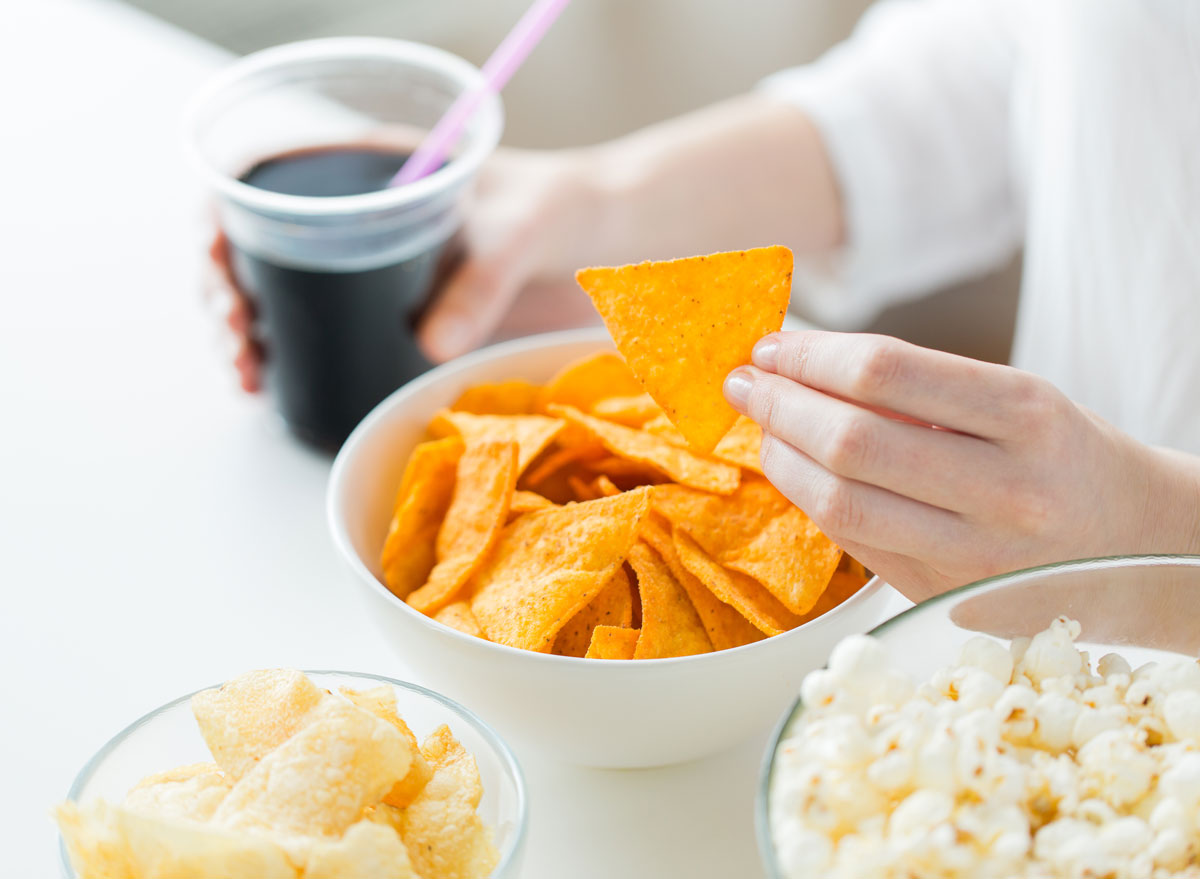
A bagel with cream cheese for breakfast. Salami on white bread for lunch. A blueberry muffin for a snack, followed by frozen chicken pot pie for dinner. What’s wrong with this picture? Besides the fact that your calorie count might be too high, all of these foods are highly processed. Here’s what you need to know about processed foods, including subtle signs that you’re eating too many of them.
While junk food is delicious, it’s no secret that eating a lot of it isn’t great for your body. Here are some of the side effects of eating junk food—if you’re experiencing these, you may want to cut back. And for more health and food news, sign up for our newsletter to get daily recipes and food news in your inbox!
What are processed foods?
Processed foods are those that have undergone any level of alterations once they’re plucked from nature—commonly freezing, canning, baking, or drying. “It’s food that’s been changed or made a bit different from its natural form,” says Torey Armul, R.D., a spokesperson for the Academy of Nutrition and Dietetics (AND).
Technically, processing can be as simple as precutting apple slices or washing and bagging salad. “Most foods are processed in some way unless you’re eating out of your garden,” says Angela Lemond, R.D. and AND spokesperson.
In other words, not all processing is bad for you. “For a long time, we’ve been adding iron and minerals to grains and cereals in the U.S., and we’ve been able to reduce a lot of nutrient deficiency and save people’s lives,” she says.
When most of us think of processed foods, however, we’re thinking of highly-processed stuff, like sodas, cookies, and candy, that simply don’t exist in nature and are slapped together in a factory. “Highly-processed foods tend to be made of too many of the wrong ingredients, like white flours, white sugars, and unhealthy fats. And they tend to have additives that increase fat, sodium, and sugar levels to increase shelf life or palatability,” says Armul.
The more whole and natural a food is, the better it is for you because it has more fiber, vitamins, and minerals, along with a better balance of macronutrients (i.e. protein, carbs, and fat). But keep in mind, the amount of processing in similar foods can vary quite a bit—and it matters.
For example, consider bread. The whole-grain stuff includes all three parts of the grain: the kernel, bran, and seed. But in white bread, the bran, which contains a lot of the food’s fiber, vitamins, and minerals, is pulled out. “I try to get people to eat more food in its most whole form. But that doesn’t mean you shouldn’t have bread because it’s processed. That’s when it goes overboard,” says Lemond.
How much processed food is too much?
While experts won’t put a number on the maximum amount of processed foods you should eat in a day or week, they recommend making a majority of your meals and snacks whole, natural foods. That means loading up on fresh fruits and veggies, lean protein, nuts, beans, and legumes. “I would say one processed food a meal is a place to start,” says Armul. Not sure if you’re eating way too much of the packaged stuff? Here are 15 side effects of processed food to look out for.
You’re thirsty all the time.

Packaged foods tend to be loaded with sodium to improve taste and to prolong shelf life. All that salt, however, can make you thirsty by displacing it from where your body needs it. “Sodium draws water out of your system, so you need to drink more to stay hydrated,” says Lemond.
Keep in mind, if you’re active or it’s very hot outside, you’ll need to drink more water. And some people process sodium differently, so you might feel super thirsty after a serving of fries while your friend is just fine. But if you’re constantly thirsty despite sipping on lots of beverages, it might be worth looking into the amount of highly-processed foods in your diet.
You’re feeling bloated.

All of that excess salt intake inevitably leads to water retention—i.e. bloating and swelling—which tends to pool in your hands, ankles, and feet. “Sodium removes water from the cells where it’s needed, and it collects in these other areas,” says Armul.
Getting more of another electrolyte, potassium—found in natural, plant-based foods like bananas, sweet potatoes, and plain yogurt—counteracts sodium. “Potassium and sodium work in a balance, so having enough can help counteract the negative effects of too much sodium,” says Armul. In just one to three days of swapping processed for these potassium-rich foods, you’ll very likely feel a whole lot lighter and less swollen, she says.
You get regular headaches.

Dehydration is a common source of headaches, researchers say. Too much salt in your diet pulls the water out of your cells, where it’s needed—and that can make you dehydrated, even if your body as a whole is retaining more water. “Sodium is the main cause of dehydration headaches,” says Armul.
Also, foods that are aged, fermented, or prepared to last on the shelf—like processed meats, canned foods, and pickled foods—contain preservatives and additives like the amino acid tyramine, which can cause headaches in certain people, according to the National Headache Foundation. “These foods can increase vasoconstriction, which causes headaches,” says Lemond.
Not sure how much sodium is too much? Armul says any food that has 400 milligrams of sodium or more per serving is a red flag. “Each person’s sodium needs vary, so that doesn’t necessarily mean it’s a deal-breaker,” she says. “But sodium content adds up quickly in a day, especially if you tend to eat more processed, restaurant, or takeout foods. So more than 400 milligrams should be considered a ‘watch what else you’re eating’ that day.”
Your teeth are a mess.

Regularly chowing down on foods packed with simple carbs like candy and chips will do a number on your teeth. According to the American Dental Association, these kinds of simple sugars lead to cavities by feeding the bacteria in your mouth, which in turn produce acids that damage your tooth enamel. Sodas and sports drinks are particularly bad for your pearly whites. They’re acidic, and acid attacks tooth enamel, says Ansel.
Your hair is thinning.

Have your locks lost their shine? When you’re eating too many processed foods, you rob your body of nutrients that are essential for a thick, healthy mane. The next time you’re craving for some crunch, pass on the bag of chips and go for a handful of walnuts. These nuts are packed with omega-3 fatty acids, which will help you grow stronger, longer tresses.
You’re tired and foggy.

Eating processed foods with loads of simple sugar—which includes, of course, straight-up sugar but also white flour and “natural sweeteners” like fruit juice—quickly spikes your blood sugar. Your insulin levels follow to transfer glucose—your body’s main fuel source—into your cells. But what comes up quickly comes down, leaving you feeling tired and mentally pooped.
Whole foods like fruits, veggies, and whole grains, however, contain fiber. And lean meats, dairy, nuts, and legumes contain fats and protein. Fiber, healthy fats, and protein, in turn, help slow down the absorption of glucose, helping you to maintain more stable energy all day long. “Eating the right amounts of the right nutrients at the right times throughout the day can fuel your brain and help with concentration and focus,” says Armul.
You’re feeling down and you don’t know why.

“Processed foods can lead to volatile ebbs and flows in energy, where a healthy balanced diet can lead to more stable moods,” says Armul. That’s in part because processed foods are high in simple carbs, which not only spike your insulin but also release certain feel-good neurotransmitters (chemicals in your brain that regulate your moods) like serotonin. While that might make you feel zippy for a minute, your levels quickly drop off, leaving you more likely to feel down soon after, explains Karen Ansel, MS, RDN, CDN.
Eat more whole foods, however, and you’re likely to get a longer-lasting mood boost. “Studies have found that healthy foods like fruits and veggies naturally improve your mood by boosting neurotransmitters,” says Armul. That effect is prolonged by the healthy fiber slowing down absorption. A 2018 study published in Frontiers in Psychology even found that eating more raw fruits and veggies was associated with fewer depressive symptoms, anxiety, and negative moods than diets with more processed versions of the same foods.
And while filling up frozen pizza and donuts can make you feel guilty, piling your plate with leafy greens and quinoa feeds a positive emotional cycle around food. “People tend to eat better when they feel better,” says Armul.
You can’t lose weight.
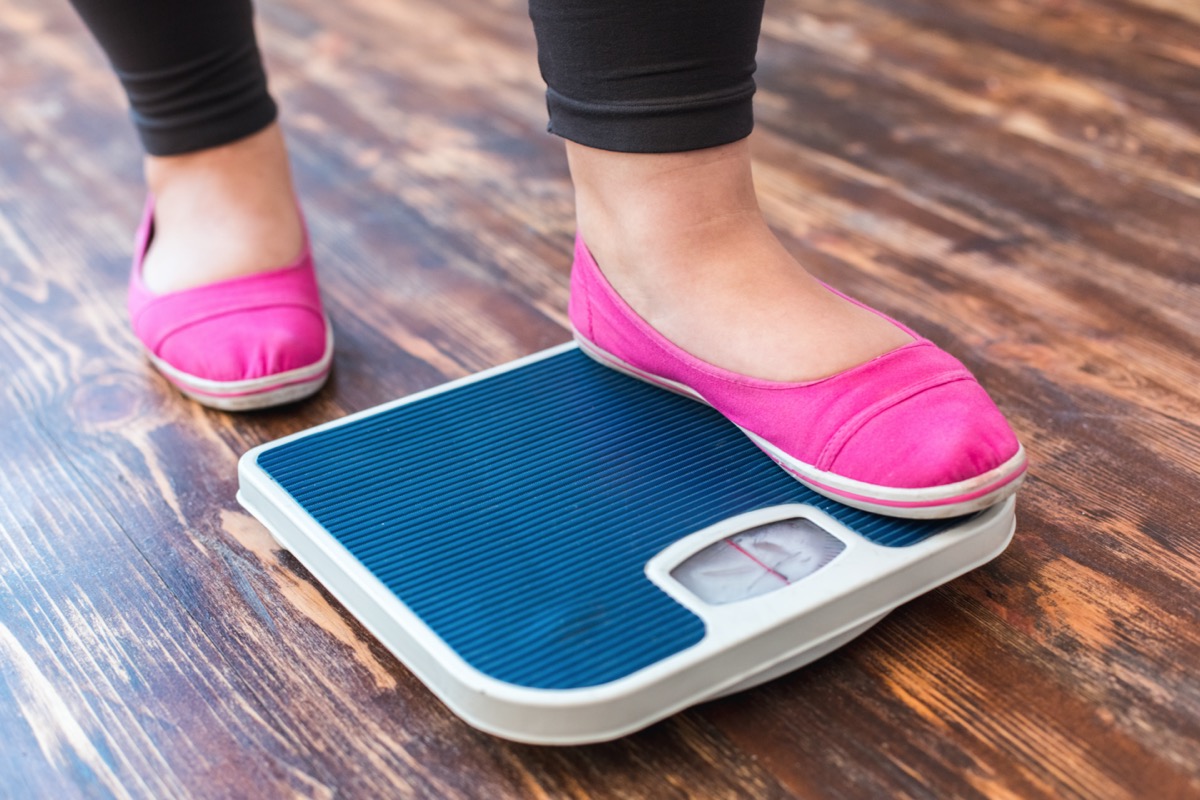
If your diet mainstays include foods like burgers and cookies, there’s a good chance you’re eating too many calories—and not necessarily because these foods are calorie bombs. “A lot of highly-processed foods don’t tend to have a lot of fullness-causing nutrients like lean protein, healthy fats, and fiber, all of which are very important for filling you up and keeping you full,” says Armul.
That means that after downing a cupcake, you’re more likely to feel hungry again quicker than if you snack on Greek yogurt and a handful of berries. You’ll then go back for a refill sooner—and ultimately eat more calories throughout the day, sabotaging your weight loss goals. “We know when you focus on diet quality, it’s a lot more satisfying, and calories balance naturally,” says Lemond.
Your bones break easily.

If your diet is filled with processed foods, there’s a good chance you’re missing out on foods like dairy, fish, and dark leafy greens that supply calcium and vitamin D, which that work together to fortify your bones. “So many people are missing out on these, which can lead to poor bone health,” says Armul.
What’s more, eating too many salty foods leaches calcium from your body, leading to bone loss, according to the National Osteoporosis Foundation. Some research has also found that sugary soda may be linked to bone loss and bone fractures.
You’re breaking out.

Most acne has to do with factors that are definitely out of your control, including genetics and hormones. With that said, some research has linked a high-sugar diet to breakouts. That’s because a high-sugar diet is believed to boost the production of certain hormones that cause inflammatory hormonal acne, which typically appears around the jawline and the mouth, says Bruce Robinson, MD, a board-certified, New York City-based dermatologist and clinical instructor of dermatology at Lenox Hill Hospital. While it’s far from a surefire solution, cutting out added sugars is a worthwhile tactic to try and tame pimples.
Your grocery bill is through the roof.
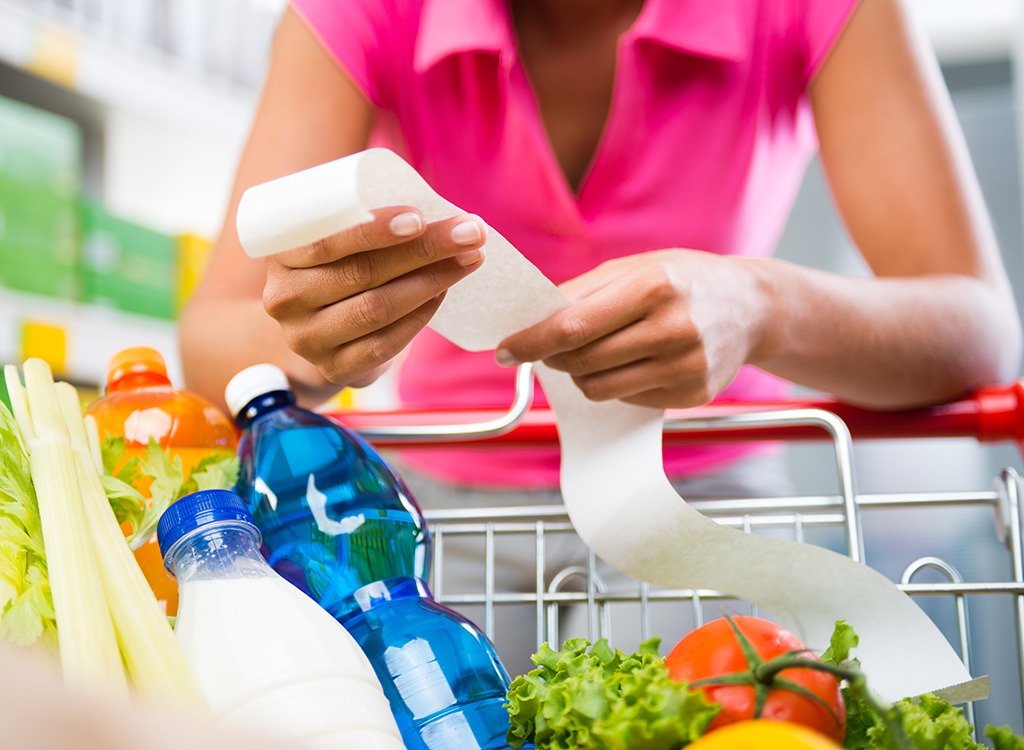
Here’s one sign of processed-food overload that you might not expect: Processed foods tend to be more expensive than whole ones, says Armul. So if you’re spending too much on your food budget, you might want to check your grocery list. “A lot of money goes into packaging and processing foods. Single-serving foods are more expensive than buying in bulk and preparing meals yourself at home ahead of time and portioning [them] out,” she says.
Your blood cholesterol and triglyceride levels are high.
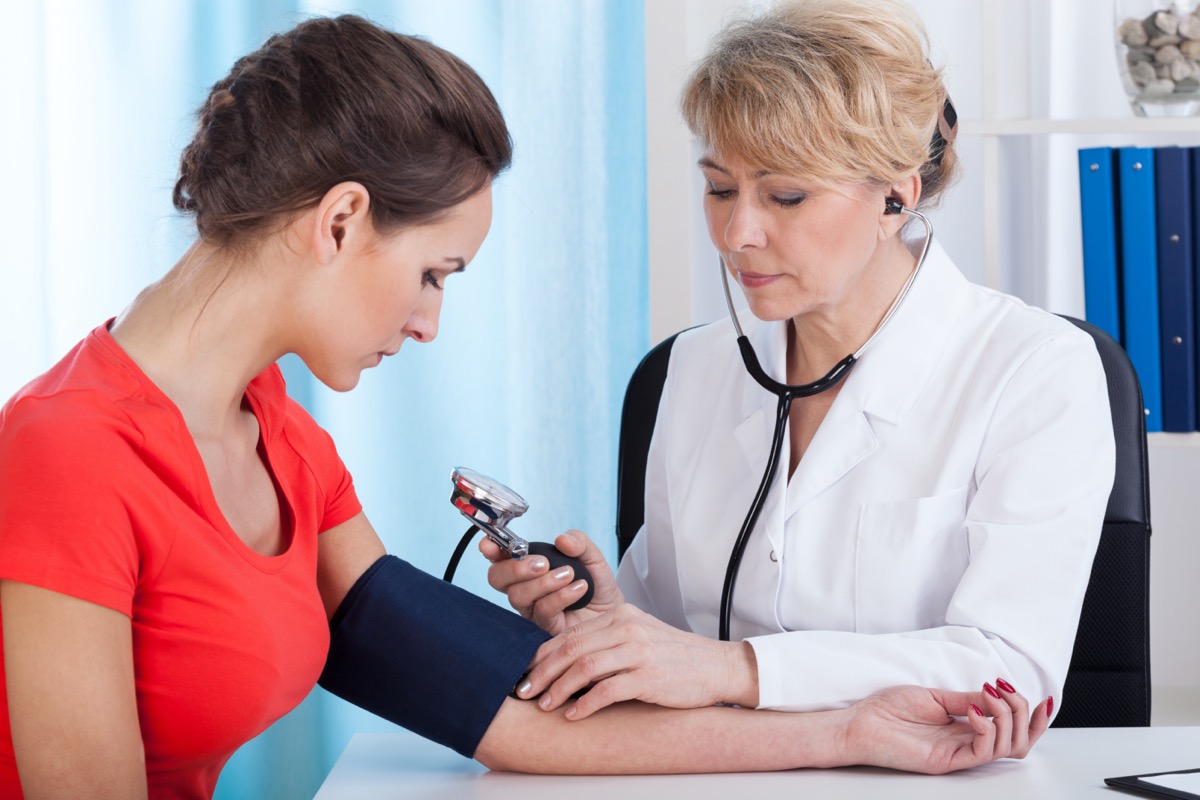
While you won’t know whether your blood glucose, cholesterol, triglyceride, or blood pressure levels are off until you visit your doctor’s office, they can all be excellent indicators of how healthy—or unbalanced—your diet is. Because processed foods tend to be higher in trans fats and sodium, eating more of them can increase your cholesterol levels and blood pressure, respectively, says Armul.
High sugar can also affect your triglyceride (fat) levels in your blood, adds Lemond. “High blood fats from eating a highly-processed diet lowers levels of good (i.e. HDL) cholesterol levels,” she says. All of these levels are linked to heart disease and other chronic health conditions.
Your glucose levels are high.
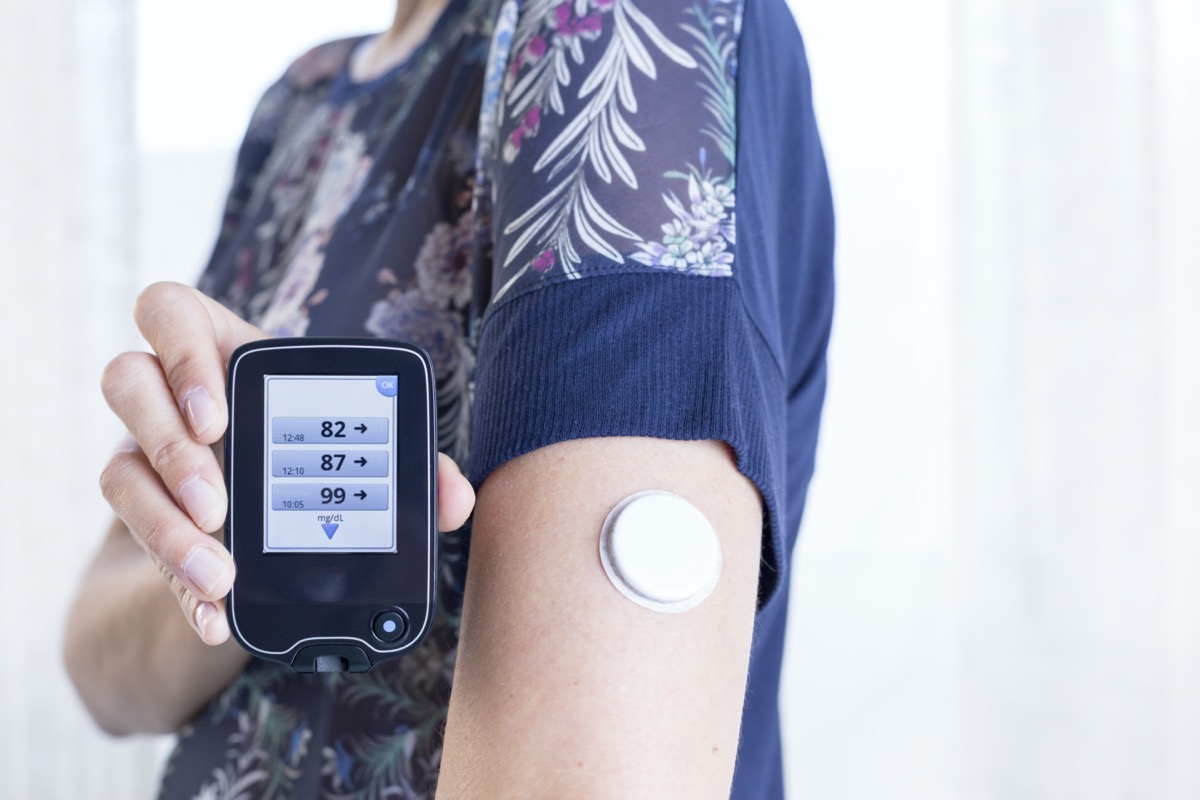
If you’re already prone to insulin resistance—say it runs in your family, or your doctor has noted your blood glucose levels are out of whack in the past—processed foods won’t help. “Processed foods tend to be high in simple carbs and added sugars, which will increase your blood sugar if you don’t have adequate insulin,” says Armul.
With that said, diabetes, in particular, is a complex condition that’s based a lot on genetics, so it’s impossible to say that processed foods are a direct cause. “Some people can eat lots of processed foods their whole lives and will never develop diabetes. But for the nearly one in 10 Americans who have diabetes or prediabetes, it’s a real concern,” she says.
You’re moody.

If you’re in the mood for no good reason, take a closer look at your diet. Processed chemicals can affect how you feel because those foods aren’t giving your body any adequate nutrition.
You have cellulite.

Although genes play a huge role, you can reduce the appearance of cellulite by eliminating processed foods from your diet. Deli meats, for example, cause water retention that makes your dimpled skin look even worse. And the sugar in soda weakens your skin’s elasticity and collagen, making cellulite easier to see. Find out more with our list of 21 Best and Worst Foods for Cellulite.








